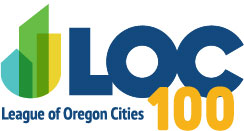LOC News
Big Week for Broadband Bills
On Thursday, the House Economic Recovery and Prosperity Committee held public hearings on four important telecom/broadband bills. A summary of each bill is below. The hearing recording is also available to view on the Legislature’s website.
HB 2411 would require notification and process for allowing interested telecommunications providers to coordinate with the Oregon Department of Transportation (ODOT) to include installation of underground infrastructure for provision of broadband as part of certain projects included in the Statewide Transportation Improvement Program. This is an open trench notification/dig once bill, only affecting ODOT. The LOC is supportive of this bill as it only affects the state.
HB 2507 decouples the Oregon Telephone Assistance Program (OTAP) from funding offered by the Federal Communications Commission. This affordability program is the state counterpart to the federal Lifeline program, which is being phased out for traditional telephone customers. The goal of this bill is to make sure that OTAP telephone subsidy does not phase out with the federal program, as it is still needed in Oregon. The LOC testified in support of this bill at the hearing.
HB 2613 is a broader version of HB 2411 and requires cities, counties, and the state to notify all telecommunication providers in the area when a street is being opened up for an infrastructure project so that conduit and/or fiber can be placed at the same time. This bill prescribes an expedited permitting process for telecommunication providers and prescribes shot clocks. The LOC testified in opposition to this bill, and many cities have also submitted written testimony in opposition. The LOC would like to thank all the cities that took the time to make their position known in the legislative record.
Bill Summary by Section
- Section 1 requires city, county and state governments to notify all previous telecommunication providers with underground facilities of excavation in the right of way, and allow providers 30 days to submit a statement of interest in collocation of underground facilities.
- Section 2 requires all telecom permit requests to be responded to by a city or county within 72 hours and all other permit requests for underground facilities to be responded to within 60 days.
- Section 3 allows for facilities to be constructed on state highways on federal lands.
- Section 4 preempts cities from requiring providers to submit detailed plans in an application on the depth and location of surrounding underground facilities if a project is 1000 feet or less in length.
HB 2654 allows an electric utility to expand the use of its electric easement for the provision of broadband services. This bill was brought forth by the rural cooperatives and has been passed in many states around the U.S. As introduced, HB 2654 was broader than original intent and could have unintended consequences on city rights-of-way. The LOC worked to get the -1 amendment so that this bill would not apply to easements that are granted by cities to electric utilities, and to strengthen the notice provisions to benefit property owners. The LOC testified to urge the committee to adopt -1 amendment of HB 2654.
Contact: Jenna Jones, Legislative Analyst – jjones@orcties.org
Last Updated 2/5/21

